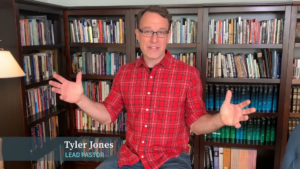You Cannot “Love Your Neighbor” by Using the Government to Do to Him the Things God Forbids.
(The Christian Intellectual) Leaders of the major world religions seem to agree that individual rights are not absolute.
For instance, consider Pope Francis: “The Christian tradition has never recognized the right to private property as absolute or inviolable and has stressed the social purpose of all forms of private property.”
Consider Timothy Keller: “Property rights are not absolute,” he says in a discussion of the Old Testament law. “The Bible’s vision for interdependent community, in which private property is important but not an absolute, does not give a full support to any conventional political-economic agenda. It sits in critical judgment on them all,” Keller says on Twitter.
Here is Russell Moore on video: Every right that we have in society is never absolute.” (See our earlier analysis here and here.)
Pope Francis, Keller, and Moore Are Badly Mistaken
What follows is an introduction to what the Bible says about individual property rights. Use these concepts in your Sunday school, your writing, or your interactions with Bible-abusers such as the three men above. First, I will overview the Bible’s concept of inviolate, individual rights. Then I will show some of the Scripture passages that demonstrate this concept.
Individually, the verses speak for themselves. But I will ask you to consider them in connection with one another in order to better understand the many ways in which the Bible both teaches and takes for granted the concept of inviolable individual rights.
As a guiding principle when looking at these verses, understand that you cannot “love your neighbor” by using the government to do to him the things God would forbid you from personally doing. This principle requires some explanation.
What God Forbids to the Individual, He Forbids to the Collective of Individuals
The actions that a government may justly take are a small subset of the actions that an individual may rightly take. No kinds of actions that are unjust when committed by an individual become just by virtue of being committed by a group.
God commands us not to steal; therefore, having a group do the stealing for us is out of the question. Or, to state the same idea in a more general and complete form: The Bible teaches that each person has an inviolable right to his own life and property (unless he forfeits that right by committing certain actions against others); therefore, it is out of the question to join with others and use the power of the group to deprive a person of his life or property. In fact, to join together with others to overwhelm and plunder the innocent is a great sin (Prov. 1:10–15).
Some may ask: “Isn’t there some special exception when talking about actions of groups — and especially governments? Couldn’t it be that it would be wrong for me as an individual to take away my neighbor’s property by threat of force, but it is perfectly justifiable in some situations for a government to do so?”
What is at stake when we ask this question? What we are really asking is: Are individual property rights absolute?
It is no surprise that leaders of world religions balk at the idea of individual property rights being absolute, because to do so would be to go against the prevailing assumptions about the nature and powers of government that extend back for millennia. “Surely, the governor has the right to collect tribute and dole it out in the form of bread, circuses, and state-managed healthcare,” such intellectuals comfort themselves — “that’s the way things have always been done.”
But have they really? Is that the system God created for his chosen people under Moses? Is that the system taught by the relevant passages throughout Scripture?
Limited Government
As you consider the selected passages below, notice that many refer not only to the relationship between a man and his neighbor, but also to the relationship between a man and his government. As history (especially the 20th Century) shows, there is great danger if a society is not careful to keep a government’s role limited.
The government does have a God-given role and power: punishing the evildoer. Even this single power is not one that somehow accrues only to the collective (and not to the individuals from which it is constituted).
A forceful response to evildoers is a right that all men naturally have. They merely delegate that right to a governing system in order to make it possible that people may live together in a society. The individuals never lay down even that one right that the state picks up. Even here, in the one area that all agree the government has a special prerogative, the government’s power comes from the consent of the governed, who are each themselves the parties that finally possess the rights.
Punishing the evildoer (specifically, the person who initiates action that harms others) is the Bible’s reason for the government’s existence — and it is the Bible’s limit on its power. The moral use of force is not unique to the government, but it is held by the government in a unique way, in situations in which civil society exists. So no, there is no special exception by which groups have the moral right to take actions that would, naturally, be morally forbidden to the individual. That includes the taking of property by threat of force.
Suppose all of the above is granted. It then becomes obvious what is wrong with the question: “How big should the government be?” or “How much power should the government have?” A government will have different sizes and different “amounts” of power, depending on the size of its population. But “how much” power is the wrong way to ask the question. Instead, ask “which” powers the government should have.
The Bible gives us the answer. It tells us exactly where the respective powers should lie. A man has the power over his own life unless he violates the rights of others. The government’s only role is to punish the evildoer and to praise the righteous man— that is, to judge between the man who has violated the right of another and the man who has not, and to use force to punish the rights-violator.
Thus, the government, the agent of force, should manage the legal system, the police, and the military. That is all it can do, according to the biblical principle of individual rights. And that is exactly what we see the government doing in the passages and principles we are about to explore.
Inviolable Individual Rights in the Bible
You find inviolable individual rights in Ex. 20:13 and Ex. 20:15: “You shall not murder” and “you shall not steal.”
You find inviolable individual rights in the principle of justice in Gen. 9:6: “Whoever sheds the blood of man, by man shall his blood be shed.”
You find inviolable individual rights in the principle of selecting judges in Ex. 18:21: “Moreover, look for able men from all the people, men who fear God, who are trustworthy and hate a bribe, and place such men over the people as chiefs of thousands, of hundreds, of fifties, and of tens.”
You find inviolable individual rights in the principle of just governance in 1 Peter 2:14, which says governors are sent by God “to punish those who do evil and to praise those who do good.”
You find inviolable individual rights in Romans 13:3–4, which gives the governor the same role as 1 Peter: to punish those who do evil and praise those who do good: “For rulers are not a terror to good conduct, but to bad. Would you have no fear of the one who is in authority? Then do what is good, and you will receive his approval, for he is God’s servant for your good. But if you do wrong, be afraid, for he does not bear the sword in vain. For he is the servant of God, an avenger who carries out God’s wrath on the wrongdoer.”
You find inviolable individual rights in the many passages describing the things that people have a right to.
Consider Acts 5:4a: “While it remained unsold, did it not remain your own? And after it was sold, was it not at your disposal?” Ownership means the ability to dispose of a thing as you chose.
Likewise, the master in Matthew 20:15a says: “Don’t I have the right to do what I want with my own money?”
Many other passages likewise support the idea that individual people have an inviolable right to their possessions.
For instance, if there were no such right, and if “needs” constituted just claims on others, could Paul have said in 2 Thess. 3:10: “The one who is unwilling to work shall not eat”?
If the state were designed as a tool to end poverty, could Jesus have said in Matt. 26:11: “The poor you will always have with you”?
If it were God’s will that the state redistribute personal property of individuals in this generation to make up for wrongs committed in prior generations, could God have said in Ez. 18:20: “The child will not share the guilt of the parent, nor will the parent share the guilt of the child”?
If God were pleased by the state taxing the people and doing great projects to “help” the nation, could Samuel have had such a distain for what the future kings of Israel would do, saying they would take “the tenth of your grain and of your vineyards and give it to his officers and to his servants”?
Samuel goes on: “He will take your male servants and female servants and the best of your young men and your donkeys, and put them to his work. He will take the tenth of your flocks, and you shall be his slaves. And in that day you will cry out because of your king, whom you have chosen for yourselves.”
Indeed, Solomon made use of forced labor, to the point that the people rebelled against his son in 1 Kings 12:4: “Your father made our yoke heavy. Now therefore lighten the hard service of your father and his heavy yoke on us, and we will serve you.”
If individual property rights were not inviolable, why would the Bible speak of the maintenance of such rights as the essence of justice? And why would it speak of the denial of such rights as the essence of oppression or injustice?
Psalm 82:3 cries to us that individual rights should remain inviolable and that governors should uphold them: “Give justice to the weak and the fatherless; maintain the right of the afflicted and the destitute.”
Isaiah 10:1–2 likewise considers the violation of property rights to be a form of wicked plunder and spoil, often committed by the very governors who had been entrusted to protect against such injustice: “Woe to those who enact evil statutes and to those who constantly record unjust decisions, so as to deprive the needy of justice and rob the poor of My people of their rights, so that widows may be their spoil and that they may plunder the orphans.”
Are these passages telling us that God cares more about justice for the poor than for the rich? Not at all. Exodus 23:3 and 23:6 make it clear that God cares about justice in procedure: “… nor shall you be partial to a poor man in his lawsuit.” It continues: “… You shall not pervert the justice due to your poor in his lawsuit.” Partiality in either direction is thus prohibited.
Possessions matter. The government is in a position to be able to dispossess people, but it must not do so. Ez. 45:9 makes it clear: “Thus says the Lord God, ‘Enough, you princes of Israel; put away violence and destruction, and practice justice and righteousness. Stop your expropriations from My people,’ declares the Lord God.”
You cannot “love your neighbor” by using the state to do to him the things God forbids.
I will share a final passage. Lev. 19:13–15 makes God’s standards clear.
“Do not defraud or rob your neighbor.
“Do not hold back the wages of a hired worker overnight.
“Do not curse the deaf or put a stumbling block in front of the blind, but fear your God. I am the Lord.
“Do not pervert justice; do not show partiality to the poor or favoritism to the great, but judge your neighbor fairly.”
Why does anyone think he can do better than the standards God has set? Why does anyone think these commands apply to individuals but not to the collective? Why does anyone think these principles can be ignored by a government?
Today, the religious leaders want to ease your conscience as you vote to support policies that take us further and further from the idea of inviolable individual rights. Such men — from Pope Francis, to Timothy Keller, to Russell Moore — are leading people away from Scripture and toward hateful, envious doctrines of demons, suitable only for cowards and thieves.
Editor’s Note. The following article was written by Cody Libolt and published at the New Christian Intellectual






















5 responses to “The Woke Religionists Are All Wrong on Individual Rights”
I sure am glad I’m not Catholic and therefore required to pay obesiesance to the man boy lover communist pompous arse guarding the pile in the vatican…
If private property did not matter to God, then why did He establish the Jubilee year?
The one where the property returns to the family who held it before it was sold (Lev 27:24)?
Great article – nailed it.
I have no idea why people hold Tim Keller up on a pedestal. He is one of the most dangerous “leaders” in the Church. When I first became Reformed, people use to fawn over him and tell me to read him. I tried him and saw right through his charade because one of the things I’ve constantly prayed for is discernment. And God has heard my prayer. People need to wake up and start studying their Bibles. Not merely reading it. Study it to show yourself as one approved!
[…] 16, 2020 News Division The Woke Religionists Are All Wrong on Individual Rights Prophetess Kat Kerr Dispatches 1000 ‘Special Ops Angels’ in ‘Red, White & […]